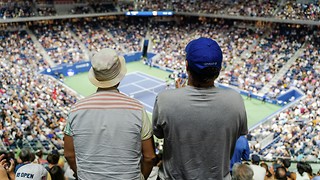Childhood, Adult – Young Adult?
Josie Bowerman explores the flourishing ‘Young Adult’ genre.
There are certain things which to know makes you an adult. The progression out of childhood is gradually learning those things. There is a line which is crossed, as you step from unknowing to knowing, and crossing that line makes you an adult.
But now there are Young Adult books. A whole new genre has sprung into being- stepped out of the ‘Twilight’ - quite literally. These books are distinctive, with bright covers, sharp and cool fonts for the blog-savvy and probably a photo of some young and unfeasibly good-looking folk. These books also seem somehow misleading.
Young adult implies someone who has newly come into their adult knowledge. They are not an unknowing child. They are not a still-learning teenager. And so they can read about what they know. But the problem is that word ‘young’. That word seems to confuse the designers of covers for Young Adult books. Young means colours and kookiness. Young means a cover that goes into stores with its cover singing something happy and innocent, a song which doesn’t know all its words yet. And teenagers pick them up, only to read about things they do not know. Should this be happening?
This is not to underestimate the knowledge of teenagers today. They are worldly-wise, they know far more than teenagers a generation ago. But surely this is a cumulative shift? If teenagers know more, then adults also know more, so that there is still learning to be done in order to become an adult. Young Adult books forget this learning gap, and present themselves in such a way as to appeal to teenagers, who then end up reading about all those things they’re yet to learn.
There’s a reason why there are certain things that you must be an adult to know. Those things are dark and painful and unjust and complicated and disappointing and cruel. Surely a teenager gets a period of grace, before all of this becomes known? Take the recent controversy over the reissue of Sylvia Plath’s The Bell Jar. Most of the criticism concerned the cover design, pink and perky, showing a retro-esque woman applying make-up. Bright and sharp and very Young Adult. Not for one minute is the intention here to prescribe what is and is not suitable for teenagers. But the issue must be questioned- should books with content as dark as that of The Bell Jar be marketed to the Young Adult demographic, which inevitably sweeps up the young along with the adults? Should the distinction between what is truly adult and what is not be kept clearer? At least then the reader can make a fully informed choice. Book design could aid that choice, making it clearer what things are to be learnt in a book. In The Bell Jar, those things would include the oppressive lives of women in the middle of the past century, sexual pressure and chronic depression. There is everything adult about these issues, and nothing young. And yet that distinction is now blurred.
At the same time, the Young Adult genre does a disservice to the issues it tends to cover- romance, growing up, finding a sense of self. By branding these issues as ‘young’, it seems to deny their importance in adult lives as well as in the lives of those still on the fringes of adulthood. It seems to dumb down the centrality of these topics, making them seem as poppy and insubstantial as a book cover emblazoned with stills from the film adaptation. It’s as if, in trying to create a single group out of two well-defined groups- the young and adults- Young Adult books overestimate the sophistication of the young, and underestimate the need of adults to connect with fundamental issues which are nonetheless linked to younger years.
The re-release of The Bell Jar seems to be an example of this problem, appearing as it does to be targeted at the Young Adult market. But surely a market group which is so unclear can never be properly targeted. The Bell Jar is a powerful adult read. Publishers should respect both its contents and its potential readers, allowing the power and the impact of the issues Plath writes about to speak out. That way, readers can make a choice with full knowledge of what they can learn from the book, and decide: am I adult enough to know these things? Or am I ready to learn them, and grow up?
 Features / The community Cambridge accommodation creates (and doesn’t)9 August 2025
Features / The community Cambridge accommodation creates (and doesn’t)9 August 2025 News / Trinity sells O2 Arena lease for £90m12 August 2025
News / Trinity sells O2 Arena lease for £90m12 August 2025 Lifestyle / An ode to college accommodation11 August 2025
Lifestyle / An ode to college accommodation11 August 2025 Sport / ‘A full-time job with overtime’: should disparities change the way we approach Bumps?6 August 2025
Sport / ‘A full-time job with overtime’: should disparities change the way we approach Bumps?6 August 2025 Features / Incoming freshers and their hopes, fears and expectations for Cambridge 12 August 2025
Features / Incoming freshers and their hopes, fears and expectations for Cambridge 12 August 2025









